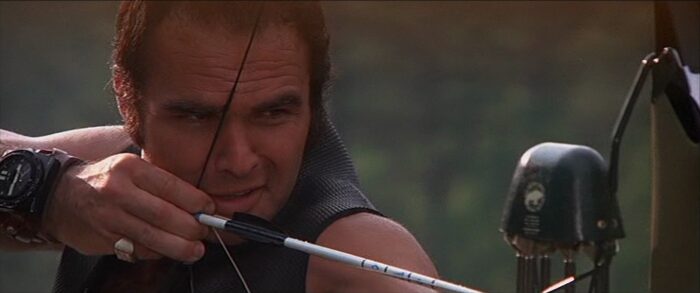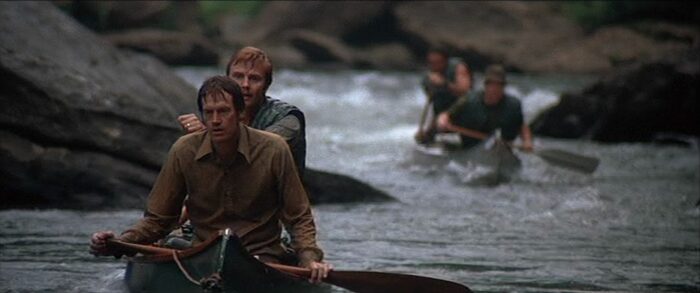
45th Academy Awards (1973)
Nominations: 3
Wins: 0
Two scenes from the 1972 thriller Deliverance have such an outsized cultural footprint that I hesitated for years to watch it. Despite everyone (especially John) insisting it was awesome, I’d already seen the iconic “Dueling Banjos” scene and heard about the infamous “squeal like a pig” moment, so I just filled in the blanks myself. I imagined an unpleasant horror film — a nightmarish descent into madness the likes of which I already kind of know I don’t have the stomach for. Boy, was I wrong… except about my preconceived notion that nature should be appreciated from afar. Deliverance did not inspire me to do any more up river rafting anytime soon.

Deliverance follows four suburban men who embark on a weekend canoe trip down Georgia’s remote Cahulawassee River before a nearby dam floods the area. Lewis (Burt Reynolds) is the group’s alpha, an outdoorsy type clad in a waterproof vest, equally confident in his survival skills and his belief that civilization is one power outage away from total collapse. Basically, he’s that guy who owns a machete and always talks about “bug-out bags.” Ed (Jon Voight) is Lewis’ friend and the next most experienced outdoors man, though plagued by self-doubt. The other two men, Drew (Ronny Cox) and Bobby (Ned Beatty), are novices. Drew is a laid-back guitarist, while Bobby is a complainer who even makes fun of the locals, definitely the guy you don’t want with you in unfamiliar territory (and the one I identify with the most). After some minor hiccups, the group sets off in two canoes and enjoy a day of navigating rapids, bow fishing, and camping under the stars. It’s everything they hoped for. For that first day.
The next day, things go sideways faster than me trying to write anything insightful about a 50-year-old movie a couple of hours after watching it. Ed and Bobby get ahead of the others and stop to rest. Two men emerge from the woods and hold them at gunpoint, tying Ed to a tree. Bobby is then assaulted in a scene that’s not only deeply disturbing but also, to me at least, surprising in its timing: we’re not even at the movie’s halfway point. Before the assailants can get to Ed, Lewis appears like Rambo-before-Rambo and kills one of the bad guys with his bow and arrow. Ed grabs the gun but the second attacker escapes into the woods. Reunited, the four men face a grim decision: what should they do with the body? Leaving it risks discovery, while taking it could mean a trial by a potentially biased jury. Hiding it offers some peace of mind, especially since the rising dam waters would likely conceal it forever—but that would also weaken their self-defense claim if it ever were found. What would you do?

I did not expect such moral complexity from Deliverance. Rather than a horror movie, it’s a tense thriller about masculinity. Each of the four main characters reveals surprising depth as the river ordeal unfolds. Since Fe-Burt-uary just ended, I couldn’t help but focus on Reynolds’ wild-man character, who is ultimately just as out of place in the wilderness as his friends. Cox and Beatty are equally impressive, especially considering this was their film debut. And Jon Voight… wow. It’s really a shame he sucks now. He risked his life for this role, performing his own stunts, including climbing a cliff solo. In fact, all the actors performed all the stunts in this movie, which is a huge part of what makes it so thrilling. Basically, Deliverance is the movie Tom Cruise has spent the last 30 years trying to top. The added realism of watching these actors constantly in danger is powerful. Movies are magic, but sometimes they’re also just the result of guts, sweat, and hard work. Gene Siskel summed it up best: Deliverance “is a gripping horror story that at times may force you to look away from the screen, but it is so beautifully filmed that your eyes will eagerly return.”
So it’s a little disappointing that Deliverance wasn’t even nominated for Best Cinematography at the Oscars that year (the honor went to Cabaret, one of its eight wins). It did earn nominations for Best Editing, Director, and Picture but lost them all to either Cabaret or that little-known critical darling The Godfather. The one award Deliverance did win was a Grammy for “Dueling Banjos,” which even cracked the Billboard Hot 100 in 1973. Fun fact: Director John Boorman received a gold record for the hit, which was later stolen from his home by gangster Martin Cahill. In 1998, Boorman directed a film about Cahill, The General, and included a recreation of that theft. Now that’s a cinema baby!
